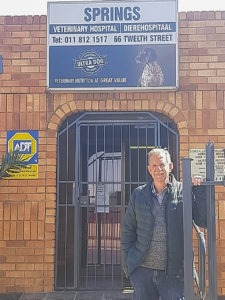Join us while we learn more about our vet of the month, Dr Christoffel Johannes van Niekerk, from the Springs Veterinary hospital in Gauteng. This amazing vet runs with the big dogs when it comes to excellent health services. That’s why we’ve asked the expert himself for top health care tips to keep your furballs fit and fabulous.
Before we dig into his pet health advice, let’s first get to know him on a more personal level.
Q: Where were you born?
A: “I was born in Barkly West, a little town north west of Kimberley.”
Q: Did you always know you wanted to become a vet?
A: “During my primary school years, I had a friend whose father, Dr Hansmeyer, was a veterinarian and the founder of the practice that I own today. We used to accompany Dr Hansmeyer during school holidays to farms and, my interest grew from there. During this period Dr Tot Pretorius was the practice partner and I grew to know him and, we later became partners.”
Q: Do you have pets?
A: “Over the years we have had many pets but, we currently have a Yorkshire Terrier, Josie, whom everyone loves to pieces.”
Q: What is your spirit animal and why?
A: “My spirit animal is definitely an Eagle. Admired as living symbols of power, freedom and transcendence.”
Well, we totally recognise and admire those qualities of strength in you, Dr van Niekerk. And we can imagine that the hundreds of furry patients you treat, do too!
Now let’s learn more about his vet practice…
Q: Where is it based?
A: “My veterinary practice is based in Springs and was built in 1960. I became the owner in 1998. I am also the appointed veterinarian for Morgan Abattoir in Springs.”
Q: What is the weirdest thing you have seen or treated a patient for?
A: “Over the years I have seen many interesting cases but, the one that stands out the most for me was, an Alsatian which jumped over a wall into a steel dropper which went in between his last ribs. Dr Pretorius had to go out and anaesthetise the dog and transport it back to the practice where I operated and removed the dropper. The dog made an uneventful recovery.”
Ouch! Poor doggo! Good to know the furry one recovered at the skilful hands of Drs Pretorius and van Niekerk. Hopefully the paw parents had pet insurance to cover the costs. 😊
Q: What is your stand-out career moment to date?
A: “I can’t think of a stand-out moment in my career but, being part of a profession that has grown exponentially over the past 20 years makes me very proud that I have been a part of it all.”
We agree, all vets are stand-out heroes to us because they’re there to help man’s best friend in times of need. #WeLoveVets
Okay, let’s bark up the tree for Dr van Niekerk’s pet health care advice…
Q: Do you have any general healthcare tips for pet parents?
A: “Balanced diets and regular vaccinations to prevent dreadful diseases are very important.”
Couldn’t agree with you more on this one, Doc!
Q: What disease is very dangerous and why?
A: “Rabies is endemic in cats and dogs throughout South Africa. Rabies is a fatal disease for humans and mammals and is caused by a virus.”
Q: How is Rabies transmitted?
A: “Dogs have long been recognised as the main transmitters of the disease to humans. Rabies virus enters a new host by introduction of the virus containing saliva into a bite wound. Entry may also be gained by saliva contamination of mucous membranes of the mouth, eyes and nasal passages. The disease is not treatable and it’s therefore imperative to have your pets regularly vaccinated by your vet.”
Q: What are the Rabies symptoms to look out for?
A: “Apart from behavioural changes there are no definitive clinical signs of rabies, although certain clinical signs are more frequent than most, even the most experienced diagnostician may make an incorrect diagnosis when presented with an unusual case. Rabies can mimic many other diseases but, it always has neurological components. Some symptoms in dogs may be change in temperament, attacking and biting anything, exaggerated response to sound and light, wandering aimlessly, drooling saliva, uncoordinated actions and progressive convulsions and paralysis.”
Sounds terrible! We urge all pet parents to ensure their furballs are regularly vaccinated by a vet to avoid this and other dreaded diseases. DYK: Our Superior and Ultimate Pet plans cover for vaccinations*.
Concluding remarks by Dr van Niekerk…
He recommends regular vet visits to pick up any abnormalities at an early stage. He continues that this is also a good way for pet parents to get information on the newest drugs and nutrition to promote better pet health.
He furthermore recommends pet insurance for its affordability and the peace of mind it provides knowing that pets can receive the best veterinary care available. Kudos to you, Dr van Niekerk!
We extend sincere thanks to Dr van Niekerk for answering our questions and for giving us such insightful advice.

You can visit the Springs Veterinary Hospital at 66, 12th Street in Springs or contact them at 011 812 1517.
*T&Cs apply and are obtainable by emailing u2us@dotsure.co.za.



